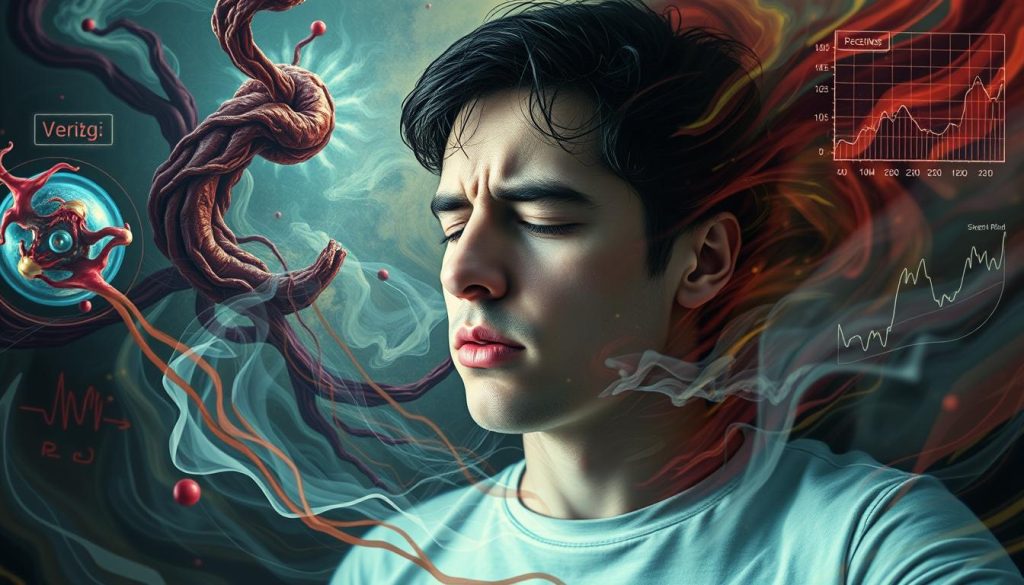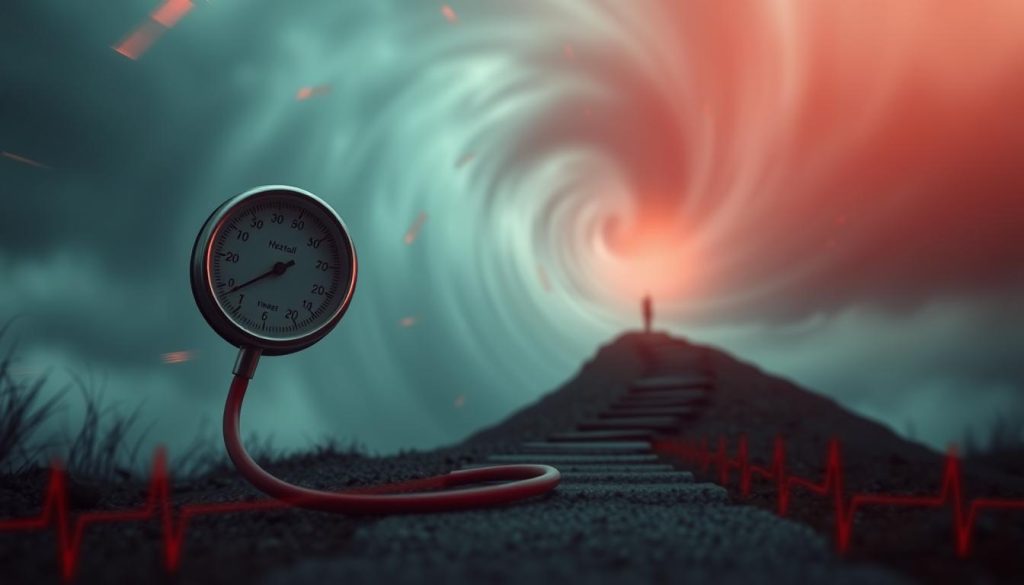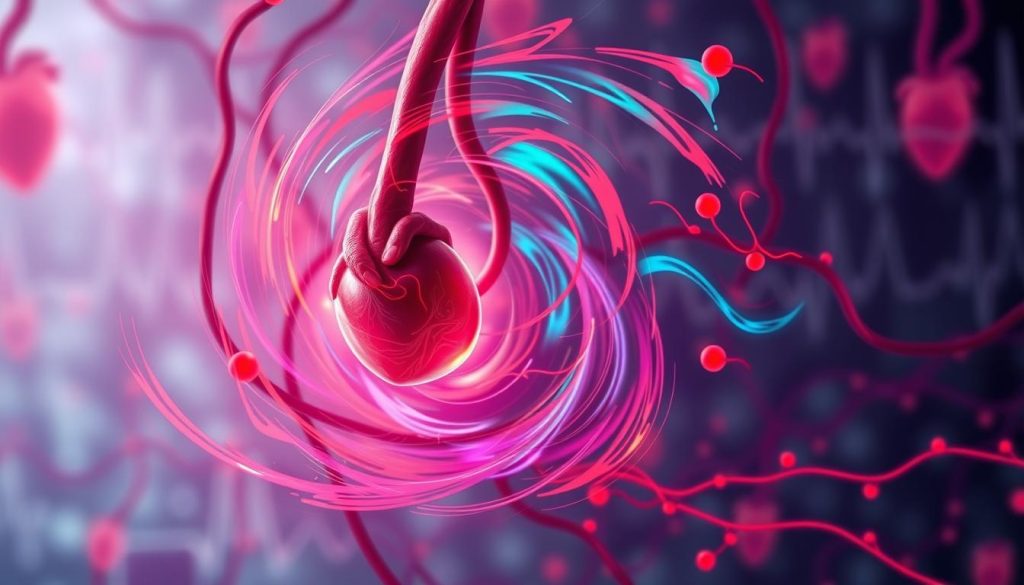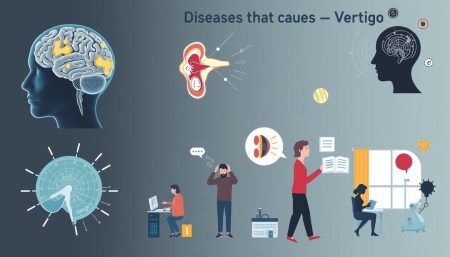Many people don’t know how high blood pressure and vertigo are connected. This connection is important to grasp. Vertigo caused by high blood pressure can change your daily life in ways you might not expect.
High blood pressure can mess with your balance and how you see space. This might cause you to feel dizzy. Spotting these signs early is crucial for managing both conditions well.
In this article, we’ll dive into the relationship between hypertension and vertigo. We’ll cover the causes, symptoms, and ways to treat them. Knowing about this connection can help you manage your health better and live a fuller life.
Understanding the Connection Between High Blood Pressure and Vertigo
The relationship between high blood pressure and vertigo is intricate. High blood pressure can harm the body’s balance and spatial sense. Let’s dive into how these issues are connected.
Defining High Blood Pressure and Its Effects on the Body
High blood pressure, or hypertension, means blood pressure is too high. This can damage blood vessels and organs. The impact of hypertension goes beyond the heart, affecting balance too.
How Blood Pressure Affects Balance and Spatial Orientation
Blood pressure is key to keeping us balanced. When it changes, it can upset our balance systems. This can cause dizziness or vertigo, showing the link between blood pressure and dizziness.
| Blood Pressure Level | Potential Balance Effects |
|---|---|
| Normal (Below 120/80 mmHg) | Stable balance, minimal risk of dizziness |
| Elevated (120-129/80 mmHg) | Slight increase in dizziness risk |
| High (130/80 mmHg or higher) | Higher risk of vertigo and balance issues |
The Inner Ear and Blood Pressure Relationship
The inner ear is crucial for balance. High blood pressure can reduce blood flow to it, causing vertigo. Knowing this helps us understand why hypertensive patients often experience vertigo.
It’s important to see how high blood pressure and balance problems are linked. By managing blood pressure, people can reduce vertigo symptoms. This improves their life quality significantly.
Can High Blood Pressure Cause Vertigo: The Scientific Evidence
Research has shown a link between high blood pressure and vertigo. Studies indicate that high blood pressure can affect the vestibular system. This might lead to balance problems. While the exact cause is still debated, there’s strong evidence of a connection.
A study in the Journal of Hypertension found a link between uncontrolled high blood pressure and vertigo. It showed managing blood pressure is key to preventing vestibular disorders.
The American Journal of Medicine reviewed the link between high blood pressure and vestibular disorders. It found that blood pressure changes can harm the inner ear. This might cause vertigo episodes.
“Our research suggests a strong correlation between hypertension and vertigo, emphasizing the need for careful blood pressure management in patients with balance issues.”
Experts think that changes in blood vessels in the inner ear might be the link. These changes can mess with the balance system. This leads to dizziness and trouble with spatial awareness.
Healthcare professionals are now focusing on treating both high blood pressure and vestibular issues. This approach aims to improve health and lower vertigo risks in people with high blood pressure.
Common Symptoms When Hypertension Triggers Vertigo
It’s important to know the signs of vertigo caused by high blood pressure. High blood pressure can mess with your balance and how you see the world around you. This can lead to both immediate and long-term problems.
Immediate Physical Symptoms
Vertigo from high blood pressure can make you feel dizzy and like you’re spinning. You might also feel sick to your stomach, sweat a lot, and have trouble staying steady. Some people feel like they’re going to pass out.

Long-term Effects on Balance
High blood pressure can cause ongoing problems with balance. You might find it harder to move smoothly, stumble more often, or always feel off-balance. These issues can really affect your daily life and how well you feel.
Warning Signs to Watch For
Look out for these signs that might mean you have vertigo from high blood pressure:
- Sudden, severe headaches
- Vision changes or blurriness
- Ringing in the ears (tinnitus)
- Unexplained fatigue
- Shortness of breath
If you notice any of these symptoms, especially with dizziness and high blood pressure, get help right away. Quick action can stop bigger problems and make you feel better.
| Symptom | Associated with Vertigo | Associated with Hypertension |
|---|---|---|
| Dizziness | Yes | Yes |
| Nausea | Yes | Sometimes |
| Headache | Sometimes | Yes |
| Vision Changes | Sometimes | Yes |
| Balance Issues | Yes | Sometimes |
Risk Factors for Developing Vertigo with Hypertension
It’s important to know what increases the risk of vertigo in people with high blood pressure. Several factors can make balance problems more likely when you have high blood pressure.
Age is a big factor in getting vertigo with high blood pressure. As we get older, our bodies are more likely to have balance problems. This makes it easier for high blood pressure to cause dizziness and trouble with spatial awareness.
Lifestyle choices can also affect your risk of vertigo if you have high blood pressure. Eating poorly, not exercising, and drinking too much alcohol can make both problems worse. Smoking is especially bad because it narrows blood vessels and hurts circulation to the inner ear.
Some medical conditions can also raise your risk of vertigo with high blood pressure. These include:
- Diabetes
- Heart disease
- Kidney problems
- Thyroid disorders
Medicines for high blood pressure can sometimes cause balance problems. It’s key to talk to your doctor if you feel dizzy or have vertigo. This way, you can manage your high blood pressure and balance issues better.
| Risk Factor | Impact on Vertigo | Impact on Hypertension |
|---|---|---|
| Advanced Age | Increased susceptibility | Higher prevalence |
| Sedentary Lifestyle | Weakens balance system | Elevates blood pressure |
| Smoking | Impairs inner ear function | Constricts blood vessels |
| Diabetes | Affects nerve function | Increases cardiovascular risk |
Knowing these risk factors helps patients and doctors work together. They can find ways to reduce vertigo in people with high blood pressure. This way, they can keep overall health and balance better.
The Role of Blood Pressure Medications in Vertigo Episodes
Blood pressure medications help control high blood pressure. But, they can sometimes cause vertigo. It’s important to understand this link to manage vertigo well.
Types of Blood Pressure Medications
There are many types of blood pressure medications. They work in different ways to lower blood pressure. Here are some common ones:
- ACE inhibitors
- Beta-blockers
- Calcium channel blockers
- Diuretics
Side Effects That May Trigger Dizziness
Some blood pressure medications can cause dizziness. This happens when blood pressure drops suddenly or fluid balance changes. It’s key to know these symptoms to manage them well.
| Medication Type | Common Side Effects |
|---|---|
| ACE inhibitors | Lightheadedness, fatigue |
| Beta-blockers | Dizziness, fatigue |
| Calcium channel blockers | Headache, flushing |
| Diuretics | Dehydration, electrolyte imbalance |
Medication Management Strategies
To reduce vertigo while managing blood pressure, try these:
- Adjust medication timing
- Gradual dosage changes
- Stay hydrated
- Monitor blood pressure regularly
Working with healthcare providers can help find the right balance. This ensures effective treatment and fewer side effects.
Diagnosing Vertigo Related to High Blood Pressure
To find out if high blood pressure causes vertigo, doctors need to do a detailed check. They use different tests to see if blood pressure and balance problems are connected. They aim to know if vertigo is caused by blood pressure or something else.
The first step is talking about your health and doing a physical check. Your doctor will ask about your symptoms, when they happen, and how long they last. They’ll also check your blood pressure and heart rate to see if it’s related.
Then, tests to check your balance and inner ear might be done. These include:
- Electronystagmography (ENG) or videonystagmography (VNG)
- Rotational chair testing
- Posturography
- Vestibular evoked myogenic potentials (VEMP)
Blood tests and scans like MRI or CT might also be needed. They help find other reasons for vertigo. Sometimes, a neurological exam is done to check for brain problems.
If blood pressure is thought to cause vertigo, a special monitor might be used. This device tracks your blood pressure for 24 hours. It helps see if blood pressure changes cause vertigo.
Getting a correct diagnosis is key to treating vertigo caused by high blood pressure. It lets doctors create plans that help with both blood pressure and balance problems.
Treatment Options for Hypertension-Induced Vertigo
Managing vertigo with high blood pressure needs a variety of treatments. Doctors suggest a combination of medicines, lifestyle changes, and alternative therapies. Let’s look at these options closely.
Medical Interventions
Doctors might give you medicines for vertigo caused by high blood pressure. These can be anti-vertigo drugs, diuretics, or blood pressure meds. It’s important to talk to your doctor to find the right mix of medicines. They should help control your blood pressure and vertigo symptoms.
Lifestyle Modifications
Making small changes in your daily life can help a lot:
- Reduce salt intake
- Exercise regularly
- Quit smoking
- Limit alcohol consumption
- Practice stress-reduction techniques
Alternative Therapies
Some people find relief with alternative treatments. These include:
| Therapy | Benefits | Considerations |
|---|---|---|
| Acupuncture | May reduce dizziness | Seek qualified practitioners |
| Vestibular rehabilitation | Improves balance | Requires consistent practice |
| Herbal supplements | Potential blood pressure support | Consult doctor before use |
What works for one person might not work for another. It’s key to work with your healthcare team to find a plan that’s right for you. By trying different treatments, many people see big improvements in their symptoms and life quality.
Preventing Vertigo Episodes in Hypertensive Patients
To stop vertigo episodes, managing high blood pressure is key. Focus on controlling blood pressure and improving balance. This can greatly lower the chance of dizzy spells.
Checking blood pressure regularly is important. Keeping a log of your readings can show patterns and what might cause vertigo. Try to keep your readings under 130/80 mmHg to lower vertigo risks.
What you eat matters a lot for blood pressure and balance. Cut down on sodium to under 2,300 mg a day. Eat more foods high in potassium like bananas, spinach, and sweet potatoes. These foods help keep blood pressure in check and support the inner ear.
- Stay hydrated to maintain proper blood volume
- Practice stress-reduction techniques like meditation or yoga
- Engage in regular, low-impact exercises to improve circulation
- Limit alcohol and caffeine consumption
It’s important to take your medications as told. If you have side effects, tell your doctor. They might change your dosage or medication to better suit your needs.
“Consistency in lifestyle changes and medication adherence is the cornerstone of preventing vertigo episodes in hypertensive patients.”
By following these steps, people with high blood pressure can manage their condition better. This helps reduce vertigo risks. Remember, being patient and consistent is crucial for long-term success in controlling blood pressure and balance issues.
When to Seek Emergency Medical Care
Feeling dizzy and having high blood pressure can be scary. It’s important to know when you need to get help right away. This could save your life in an emergency.
Critical Warning Signs
Watch out for these signs that could mean something serious:
- Sudden, severe headache
- Vision changes or loss
- Difficulty speaking or understanding speech
- Numbness or weakness on one side of the body
- Chest pain or shortness of breath
- Fainting or loss of consciousness

Emergency Response Protocol
If you have these symptoms with dizziness and high blood pressure, do this:
- Call 911 or your local emergency number right away
- Sit or lie down to avoid falling
- If you can, take your blood pressure
- Don’t drive yourself to the hospital
- Stay on the phone with emergency services until help gets there
Acting fast when you have a hypertensive crisis with vertigo can stop serious problems. Don’t wait if you’re not sure how bad your symptoms are.
| Symptom | Possible Cause | Action Required |
|---|---|---|
| Severe dizziness with high BP | Hypertensive emergency | Immediate medical care |
| Mild vertigo, stable BP | Benign positional vertigo | Schedule doctor appointment |
| Vertigo with chest pain | Possible heart attack | Call 911 immediately |
Living with Both Conditions: Management Strategies
Managing vertigo with high blood pressure is tough, but doable. Keeping a daily routine is important. Start by tracking your blood pressure and logging vertigo episodes. This helps you and your doctor find patterns and adjust treatments.
Lifestyle changes are crucial for managing vertigo with high blood pressure. Eat a low-sodium diet, try gentle exercises like tai chi or yoga, and reduce stress. These steps can help keep your blood pressure stable and lessen vertigo attacks.
Creating a safe home is vital for those with hypertension and balance issues. Remove tripping hazards, install grab bars, and ensure good lighting. Support groups and online forums offer tips and emotional support from others facing similar challenges.
Consistency is key in managing these conditions. Stick to your medication, attend regular check-ups, and contact your healthcare provider if symptoms change. With the right care, you can live a fulfilling life while managing vertigo and high blood pressure.
FAQ
Q: Can high blood pressure directly cause vertigo?
A: High blood pressure doesn’t directly cause vertigo. But, it can lead to it. Hypertension can harm the inner ear’s blood supply and the vestibular system. This might cause balance problems and vertigo symptoms.
Q: What are the common symptoms of vertigo related to hypertension?
A: Symptoms include dizziness, a spinning feeling, loss of balance, nausea, and headaches. These can get worse with sudden blood pressure changes or when changing positions.
Q: How is vertigo diagnosed in patients with high blood pressure?
A: Doctors use physical exams, blood pressure checks, vestibular tests, and sometimes imaging. They also look at your medical history and symptoms to see if vertigo is linked to high blood pressure.
Q: Can blood pressure medications cause or worsen vertigo?
A: Yes, some blood pressure meds can cause dizziness or vertigo. Diuretics, beta-blockers, and ACE inhibitors are examples. These can affect some patients.
Q: What lifestyle changes can help manage vertigo in hypertensive patients?
A: Eating well, exercising regularly, reducing stress, and avoiding alcohol and caffeine can help. Also, getting enough sleep is important for managing both high blood pressure and vertigo.
Q: Are there specific exercises to alleviate vertigo symptoms?
A: Yes, exercises like the Epley maneuver or Brandt-Daroff can help. But, always talk to a doctor before starting any new exercise.
Q: When should I seek emergency care for vertigo and high blood pressure?
A: Go to the emergency room if you have severe vertigo with high blood pressure. Also, seek help for chest pain, trouble breathing, severe headaches, or sudden weakness or numbness. These could be signs of a serious problem.
Q: Can managing high blood pressure help prevent vertigo episodes?
A: Yes, managing your blood pressure can lower the risk of vertigo. This includes taking medication, making lifestyle changes, and regular check-ups.
Q: Is there a link between hypertension and vestibular disorders?
A: Research shows a possible link between high blood pressure and vestibular disorders. High blood pressure can affect the inner ear’s blood supply. This might impact balance and lead to vestibular issues.
Q: Are there alternative therapies for managing vertigo with high blood pressure?
A: Alternative therapies like acupuncture, herbal supplements, and relaxation techniques might help. But, always talk to your doctor before trying them, especially if you’re on blood pressure meds.


















